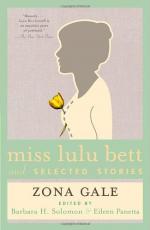“Put an end to this, Lulu,” he commanded. “Where were you two—since you make such a mystery?”
Di’s look at Lulu was piteous, terrified. Di’s fear of her father was now clear to Lulu. And Lulu feared him too. Abruptly she heard herself temporising, for the moment making common cause with Di.
“Oh,” she said, “we have a little secret. Can’t we have a secret if we want one?”
“Upon my word,” Dwight commented, “she has a beautiful secret. I don’t know about your secrets, Lulu.”
Every time that he did this, that fleet, lifted look of Lulu’s seemed to bleed.
“I’m glad for my dinner,” remarked Monona at last. “Please excuse me.” On that they all rose. Lulu stayed in the kitchen and did her best to make her tasks indefinitely last. She had nearly finished when Di burst in.
“Aunt Lulu, Aunt Lulu!” she cried. “Come in there—come. I can’t stand it. What am I going to do?”
“Di, dear,” said Lulu. “Tell your mother—you must tell her.”
“She’ll cry,” Di sobbed. “Then she’ll tell papa—and he’ll never stop talking about it. I know him—every day he’ll keep it going. After he scolds me it’ll be a joke for months. I’ll die—I’ll die, Aunt Lulu.”
Ina’s voice sounded in the kitchen. “What are you two whispering about? I declare, mamma’s hurt, Di, at the way you’re acting....”
“Let’s go out on the porch,” said Lulu, and when Di would have escaped, Ina drew her with them, and handled the situation in the only way that she knew how to handle it, by complaining: Well, but what in this world....
Lulu threw a white shawl about her blue cotton dress.
“A bridal robe,” said Dwight. “How’s that, Lulu—what are you wearing a bridal robe for—eh?”
She smiled dutifully. There was no need to make him angry, she reflected, before she must. He had not yet gone into the parlour—had not yet asked for his mail.
It was a warm dusk, moonless, windless. The sounds of the village street came in—laughter, a touch at a piano, a chiming clock. Bights starred and quickened in the blurred houses. Footsteps echoed on the board walks. The gate opened. The gloom yielded up Cornish.
Lulu was inordinately glad to see him. To have the strain of the time broken by him was like hearing, on a lonely whiter wakening, the clock strike reassuring dawn.
“Lulu,” said Dwight low, “your dress. Do go!”
Lulu laughed. “The bridal shawl takes off the curse,” she said.
Cornish, in his gentle way, asked about the journey, about the sick woman—and Dwight talked of her again, and this time his voice broke. Di was curiously silent. When Cornish addressed her, she replied simply and directly—the rarest of Di’s manners, hi fact not Di’s manner at all. Lulu spoke not at all—it was enough to have this respite.
After a little the gate opened again. It was Bobby. In the besetting fear that he was leaving Di to face something alone, Bobby had arrived.




